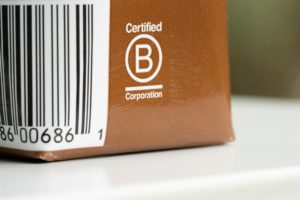What Is a Certified B Corporation?
|
Getting your Trinity Audio player ready...
|

You may have seen the “Circle B” logo, but what does it mean? The logo can only be displayed by a Certified B Corporation. These are companies that have achieved a minimum score on an evaluation of their corporate governance, community, employee, and environmental benefits. Here’s what you need to know about this entity.
What Is a Certified B Corporation?
Certified B Corporations are for-profit entities that exhibit world-class standards for sustainability, transparency and accountability. These standards are audited periodically by the independent industry standard organization, B Lab.
B Corp Certification can be likened to Fairtrade or USDA organic certification for products such as bananas or milk. The difference is that the certification looks at a company as a whole rather than just a single product. According to Juan Pablo Larenas, Executive Director of B Lab Global, “The B Corp Certification does not just evaluate a product or service; it assesses the overall positive impact of the company that stands behind it”.
B Lab issues the B Impact Assessment, a free online tool that any company can use to assess its social and environmental performance. The assessment is scored out of 200 points. The average score for companies who complete the assessment is between 40 and 60 points. Certified B Corporations however are required to maintain a minimum verified score of 80 or above. Companies are able to compare their scores and share resources to help improve their score over time.
The B Impact Assessment is a strict evaluation assessing a company’s overall impact on their workers, community, customers and environment. This holistic look at a company certifies a certain level of compassionate capitalism. Certified B Corps signal to potential customers and partners that they value stakeholder primacy over profit maximization. Increasing numbers of investors and customers now seek out companies that demonstrate sustainable business practices.
B Corporation Requirements
- Verified social and environmental performance. By maintaining their minimum B Impact score of 80 and submitting triennial assessments, Certified B Corps undergo a rigorous process to have their standards independently verified.
- Transparency. Certified B Corporations are required to share their B Impact Score publicly on bcorporation.net.
- Accountability. Many Certified B Corporations have adopted various legal structures which require them to consider their impact on all stakeholders of the company. These structures include traditional LLCs and corporations, as well as public benefit corporations and public benefit LLCs.
How to Form a B Corporation
The first step of the B Corp application is to complete the B Impact assessment. Companies are required to have a minimum score of 80 in order to achieve certification. Companies must then maintain their passing B Impact score and recertify every three years.
Becoming a B Corp is not simply a “participation trophy”. B Lab audits an applicant’s business practices, which is often a seven month process. It entails the initial 216 question application, the production of corporate documents and a series of interviews. Certification requires a company to open its books, goals and overall purpose for complete assessment based on standards set by the trained professionals at B Lab. Certified B Corps need to prioritize and disclose their impact to ensure continued progress toward their social, environmental and governance goals.
The rigor associated with B Corp certification distinguishes companies that make a real impact from those just with good marketing. Applying for B Corp status may not result in more business initially. Companies pursuing this certification look to legitimize their commitments to sustainability.
The New “B Economy”
As the number and popularity of Certified B Corps has grown, so has their influence over other companies. The “B Economy” represents the greater community surrounding B Corps. This includes the more than 40,000 companies that have used the B Impact Assessment to improve their social and environmental performance, the millions of customers who buy from and support sustainable businesses, and the increasing number of investors seeking to invest in Certified B Corps.
According to B Lab, over 120 venture capital firms have invested more than $2 billion in Certified B Corporations. The prevailing theory amongst these firms is that producing stakeholder value will produce the best financial returns.
Although the B Corp movement started in the United States, it has spread all over the globe. There are now more Certified B Corps based outside of the United States than inside. Large multinational companies are beginning to adopt and promote B Lab standards throughout their global operations. In 2017, the French multinational Danone announced its intention to become the first Fortune 500 company to achieve B Corp certification. The company has already helped several of its subsidiaries achieve B Corp status. As of 2018, Danone has nine subsidiaries that are now Certified B Corps.
The emergence of the B Economy is an exciting development. It means that anyone can participate in the broader movement to conduct business in a way that is best for profits and for the world. Certified B Corps represent a global community of leaders that benefit from increased credibility and trust. This enables them to attract more talent and promote better employee engagement.
IncNow: Delaware’s First B Corp
In May 2019, IncNow became the first incorporation service worldwide to be a Certified B Corp, and the first Certified B Corp in the State of Delaware. IncNow’s shareholders and directors approved an amendment to its corporate charter to declare its public benefit purposes, making them part of its governance structure. The company dedicates five percent (5%) of annual gross profits to support the environment, education, entrepreneurship and the arts in the greater Delaware Valley.
Examples of IncNow’s involvement in preserving and remediating the environment include its commitment pro bono clean water advocacy. The company is also involved in the leadership structures of the Delaware Natural Areas Advisory Council and the Christina Conservancy. It has also sponsored watershed cleanup initiatives and conservation in Delaware’s nature preserves.
IncNow stands out even amongst Certified B Corps, earning the Best for the World award in corporate governance. Companies receiving the Best for the World honor rank in the top 5% of all B Corps worldwide for their impact in specific areas included in the B Impact assessment. Examples of IncNow’s award-winning governance include sponsoring athletic competitions for employees and company sponsored trips to destinations such as Portugal, Hawaii, Iceland, and Netherlands.
Pros and Cons of Forming a B Corporation
Forming a B Corporation also known as a Public Benefit Corporation (PBC) offers a unique business structure that allows the management to take into consideration stakeholder interests in the mission locked public benefit purpose that may not maximize the value to stockholders. To customers, employees, community and investors, it shows a commitment to certain social and environmental objectives. However, like any business decision, there are both pros and cons to consider. Here’s a breakdown:
Pros of Forming a B Corporation
1. Credibility and Trust:
Beyond simply incorporating as a PBC (or public benefit LLC), often these businesses seek out third party validation that they really are doing good. For example the gold-standard of this certification process is by a third party service, known as B-Lab at BCorporation.Net. B Corp certification is widely recognized as a symbol of commitment to social and environmental performance, making it easier for customers and investors to trust your business.
2. Attracting Purpose-Driven Customers:
Many consumers prefer to support businesses that are socially and environmentally responsible. Being a B Corp helps your company appeal to this growing market of conscious consumers.
3. Access to a Like-minded Network:
As a certified B Corp, your business joins a global community of purpose-driven companies, providing opportunities for collaboration, partnerships, and sharing best practices.
4. Employee Satisfaction and Retention:
Companies that focus on a broader mission than profit often attract employees who are passionate about making a positive impact. This can lead to higher employee engagement, satisfaction, and retention.
5. Legal Protection for Mission:
B Corps are legally able to consider the impact of decisions on stakeholders (not just shareholders), which helps protect the company’s social mission, even if owners think that decision is wasting potential corporate profits.
6. Attracting Impact Investors:
B Corps often have access to a broader pool of investors who are looking to make a positive impact, in addition to earning a financial return.
7. Marketing and Brand Differentiation:
B Corp certification can serve as a unique selling point, helping to differentiate your company in a competitive market and appeal to consumers who prioritize social and environmental responsibility.
Cons of Forming a B Corporation:
1. Costs and Time Commitment:
Certification involves application fees and costs for the required assessments. It can also be time-consuming to gather the necessary documentation, which may involve dedicating significant internal resources.
2. Rigorous Standards:
B Corps must meet high standards across various aspects of the business, including governance, workers’ rights, environmental impact, and community engagement. Maintaining compliance with these standards requires continuous effort.
3. Ongoing Reporting and Recertification:
B Corps must complete recertification every three years, which requires ongoing transparency and updating of practices. This can be a significant administrative burden. Additionally a Delaware PBC must report to its shareholders every other year on how it is advancing the public benefit mission.
4. Potential for Public Scrutiny:
Because B Corps are committed to transparency, they can face public scrutiny if they fail to live up to their standards, which can damage the company’s reputation.
5. Limited Focus on Financial Performance:
While B Corps balance social impact and financial performance, some investors may prefer a stricter focus on profitability, potentially making it harder to attract traditional venture capital or certain financial backing.
6. Complex Governance Structure:
Companies must integrate social and environmental goals into their legal structure. This may require changes to the company’s bylaws, governance documents, or operating procedures, which can be complex and challenging to implement. For example the B Corp must consider their Greenhouse Gas emissions through direct and indirect activities. This is not just a smokestack that emits carbon dioxide, but also considers the commute of employees to an office.
7. Limited Global Recognition:
While B Corp certification is growing, it is not universally recognized across all regions or industries. In some markets, it may not carry as much weight or may be less relevant to customers who just want to get the lowest price without concern about negative externalities, built into the products and services being consumed.




